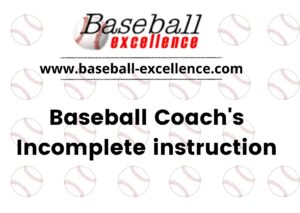In the past we have talked about how important a routine is for athletes and baseball players in particular. The nature of the game of baseball does not lend itself to the extremes of emotion. A more steadfast approach is justified. Approach baseball the same way, every day and every game. An established routine helps players stand up to the rigors of the summer grind of 50 plus games.
In fact Coach Grant always felt that a part of his job was to instill in his players how long a baseball season is and prepare them for it as if they were to advance.
Get Up For the Big Game?
We had an interesting question some time ago on our discussion board. A member asked, “How do I get my players “up” for a big game? I took it to mean, “How do I prepare my players to get emotionally ready to play in a big game? What can I do to assure that they will play well?” I thought about that a while and my answer was that you shouldn’t get baseball players all fired up. It‘s not like a pre-game football locker room where a coach has his players jumping up and down, ready to “kill.”
Side Note: We are fortunate to have a great football coach in Vero Beach, Billy Livings. Billy has a consistently excellent program and Friday nights in Vero Beach are an event. They seat over 5,000 fans every week. I have had 2 season tickets for 10 years. Battles are waged in divorce courts over Vero Beach High School season tickets.
Billy always has some outstanding pre-game speech to motivate his players. He has a knack for defining a moment. Once before a playoff game the players were in the locker room, totally on edge, waiting for Billy. You could almost smell the anticipation and apprehension. Billy waited quite a while. Then at the last moment he walked into the room with his assistant coaches and slowly looked around at his team, nodding his head. The room became very still and quiet. Then, in his Alabama country drawl he simply said, “Well boys, I think we have enough to lick that team.” He turned around and walked out. The players went crazy. I think they would have run through a wall for their coach.
That is football. The same approach doesn’t work in baseball. A more even keel is called for. In football, you play against another team. In baseball, you play against the “Game.” The ball is hit to you; you field it and throw it. The ball is pitched to you; you swing at it. The pitcher attempts to hit his target. It doesn’t matter if you are playing a great team or a poor one. It doesn’t matter if it is a big game or one with little consequence. The approach is always the same. Play against the game. No trick plays- no ruses to surprise the other team. No flea flickers. No clock killing drives. You have to throw the ball over the plate and someone tries to hit it. You can’t delay the inevitable. Sound, fundamental baseball is the way to prepare kids to play the game.
It is usually the team that does the best job of making the routine plays that wins. I say usually. The vagaries of competition, the length of a season and the nature of the game make it almost impossible for a team to go undefeated. In football winning nine or ten games defines a great season. In baseball you can lose nine or ten games and still be a great team. Football is a sprint. Baseball is a marathon.
If football is high emotion and intensity, baseball is skill and cerebration; the art of pitching, the art of hitting, the art of base stealing. Throughout baseball, failure defines the nature of the game. It is really hard to play. The skills are demanding and they require relaxation and explosive movements almost simultaneously.
Motivational speeches have little effect over the course of a long season. So what do the players have to rely on? A solid, consistent routine. A coach should design his own procedures, one that will fit his team. Have a separate routine for practice days and for game days. Have a separate routine for home games and away games.
What does a coach want to accomplish with this routine? What can he do to ensure the health and safety of his players? Does his routine enforce baseball skills and get his kids ready to play? A daily preset schedule allows practices and pre-games to run more smoothly. Everyone knows what they are to do. After a period of adjustment, (you have to get your players to accept your way) an established procedure of doing things provides a better teaching environment. The kids and coaches know what they are supposed to be doing. Everyone is on the same page. This is a time saver and allows for more instruction and repetitions. There is something comforting about arriving at the ballpark, knowing what you are going to do that day and knowing what is expected of you. I believe it has a way of instilling confidence in the players.
A sound, organized structure prepares players to play.
Tips for an Effective Routine
- Stretch, form run and throw before every practice and every game. Do not neglect this step. (You are probably tired of hearing us talk about this. But it is that important.) This is the first thing we do at practice. Early arrivals play pepper. They do not throw before the designated long toss time period. Everything is done as a team. If practice is to start at 4:30, start it on time. Don’t wait for late arrivals. Make the kids adapt to your schedule. Don’t fit yours around their impulses and whims. Late arrivers have a way of being chronic. My approach is to simply ignore these players. I focus on the ones who are punctual. I have found that the most dedicated players are almost always at the field early. They get most of my attention. Sometime this approach brings the habitual slowpokes into the fold. Anyway, you know what the old scout said, “SW, SW, SW.” Some will, some won’t, so what.”
- At the high school level the players have to get the field ready for practice or a game. So as they arrive this is the first thing they should do. They set up the screens, put out the bases, get the equipment. On game days they line the field, rake and prepare the mound and batter’s area and paint the bases.
- Some teams may hit in the cages before stretching. If that is what they do they should do it that way every day.
- Have a set routine for rainy and/or wet days. Wet grass ruins baseballs. If it is not raining and simply wet, hit in the cages with old balls. On rain days find a quiet building where you can run a baseball classroom. A blackboard and TV with VCR would be good. Whatever your facilities, be prepared and let the kids know what to expect no matter what the conditions are. Have practice, rain or shine.One summer a few years ago, Coach Grant felt his pitching staff needed to develop a change up they could throw with confidence. So one rainy afternoon we all went into the clubhouse. (Vero Beach High School is fortunate to have a nice clubhouse/locker room for baseball only.) Each pitcher got up in front of the group and “threw” his fastball. (Just the grip. They didn’t let go of the ball.) Everyone listened to the “whoosh” the arm makes as it goes through its throwing motion. You can hear it in a quiet room. Then they gripped the baseball in a change up grip. Again we listened for the same sound. That sound told us the pitcher was throwing his change up with fastball arm speed. That was a pretty good demonstration. And it reinforced in the players’ minds how important fastball arm speed is when throwing the change. That was a very beneficial day for those kids. In fact, every day should be a learning experience for your players. A little thought and creativity can go a long way toward developing skilled baseball players.
- Your batting practice should be run essentially the same way every day. Occasionally you may add situational hitting or opposite field drills but the meat of batting practice should be routine. Utilize stations, have the same groups hit together, make sure everyone hustles, etc. Hit ground ball fungoes during batting practice. Pitchers can throw bullpens during batting practice.
- Have a set procedure for bullpens. Pitchers should warm up and throw the same way every time. They should know what day they are going to throw in relation to their starts. Structure your practices and pre-games so that a catcher is always available at the appropriate time. Nothing is more time wasting than a coach trying to find a catcher so his pitcher can throw his pen. (The Vero Beach Dodgers have their catchers hit in the first group in batting practice so that they are available when needed.)
- Have a procedure for pre-game bullpens and bullpens during games.
- Pre-game outfield-infield should be run the same way every time.
- All away games should have a schedule and be very structured. These are some of the things that Coach Grant required of his Legion teams when they traveled. Safety and discipline received high priority.
- Everyone left together, parents and players alike. If a player drove, he was placed in the middle of the caravan with a coach in the lead car and a parent or coach in the last vehicle. If you were late, you were left behind.
- There were no unnecessary stopovers or sight seeing tours. Coach Grant’s saying was, “We get on the bus. We arrive at the field. We kick their butts, we get back on the bus and go home.” All business.
- He usually scheduled the time of departure so that when we arrived we went straight to the field and played the game rather than going to the hotel first. He felt there were fewer distractions that way. (I believe you could parachute Coach Grant’s players into the middle of the Gobi Desert and they would be ready to play.)
- Everyone checked into the hotel together. Good behavior was required at all times. (We tried to get accommodations at first rate hotels whenever we could. Another one of those “little things.” The players looked forward to the travel.)
- There were three players to a room and whenever possible we grouped the players by one older with two younger.
- Some time leeway was allowed but there was an “in the room” curfew.
- We checked on players’ rooms periodically during the night.
- There was a set time to be in the lobby in the morning and the players then went to breakfast together.
- Strict decorum was mandatory at all meals. We once had a waitress in Bradenton tell us that she had never seen baseball players so well behaved. (I’m sure the tips didn’t hurt.)
- If we were to stay more than one night the parents were asked to find a laundry facility and wash the players’ uniforms. That often kept them up until the wee hours of the morning.
- On the morning of departure everyone met in the lobby and an assistant coach then checked all the players’ rooms. (We were always invited back to every hotel where we stayed.)
- The same procedure for driving home was observed as the one when we left. We all drove back to our departure point so that the equipment could be offloaded.
- Then it was home and usually Monday off. Practice on Tuesday.
There should be a routine for after practices and games. It should involve talking with the team, cleaning up the dugout and preparing the field. All your routines and procedures are dependent on effective time management. This requires quite a bit of planning. Adults’ daily lives involve all kinds of routines. Someone once said that daily routines are the signposts of a civilized society.
Give your players structure and time they can look forward to, and they will reap the rewards.
“Baseball is life. The rest is just details.”
This article is from our book, “A Coach’s Guide To Baseball Excellence.”



